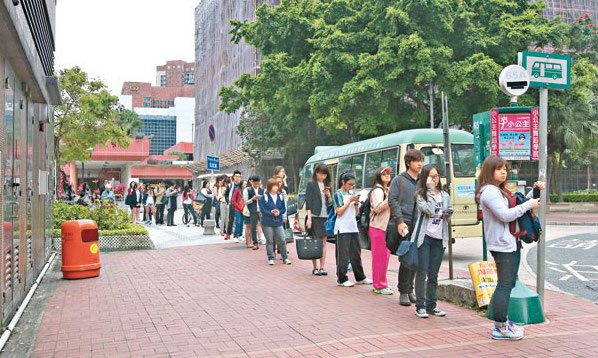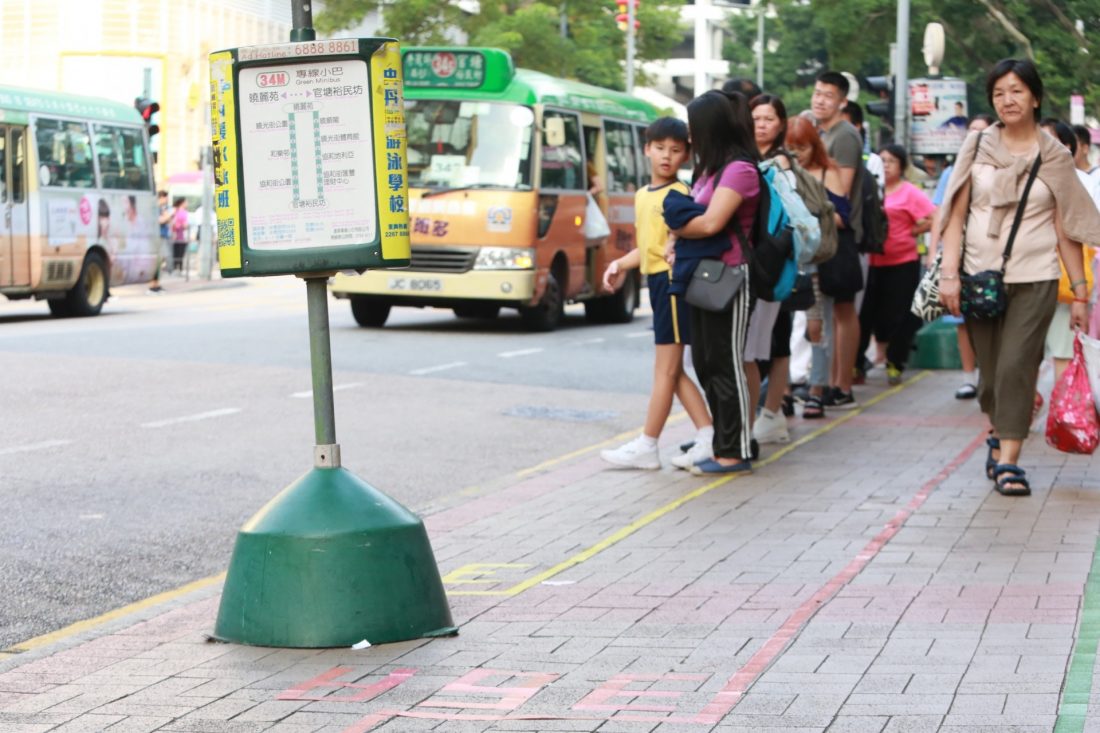This morning when I was queueing up for a very long mini-bus line, I started approaching the front of the line before my mother said loudly in cantonese “There are many cunning people that stand purposely at the front of the mini-bus line pretending to be there the whole time, when in reality they are just not bothered to line up!”
As she rambled on about these commonly dismissed situations in Hong Kong my father told her to keep quiet to avoid unwanted attention. I noticed that there was a lady standing beside the front of the line who was not lining up for any of the multiple queues at the bus stop, prompting my mother to speak about this.
After the mini-bus journey, I approached my mother, questioning her about the details of what had occurred. She told me two situations that were similar to today’s one but they had different outcomes.
In one instance that happened a week ago, there was a woman who had stood at the front of the mini-bus line boldly and shamelessly without lining-up. “Nobody seemed to say anything about it, but due to my outspoken nature I said to her ‘Ma’am you have to line up’,” my mother recalled.
The woman ignored my mother, and continued to remain at the front of the line. But those lining up at the front had said nothing. The woman did not manage to get on the first minibus due to few passengers getting off at the stop.
“During those minutes when those in line were waiting for the next minibus, not a single individual used the opportunity to criticize or inform her about her lack of basic public etiquette.”

Nonetheless, the woman seized the opportunity to get onto the next mini-bus that arrived. My mother said loudly ‘the woman skipped the line’ trying to stop her from getting onto the bus, but because she was far from the front of the line, the woman pretended not to hear.
“To make matters even more maddening, the bystanders in the queue ignored me and some had shot me weird looks after I criticized the woman. The woman then proceeded to get on the bus hurriedly to avoid confrontation from me.” Saying that my mother felt a mixture of being perplexed, irritated and frustrated is an under-statement.
During our discussion we focused on the lack of response from other people in the mini-bus line. Firstly, was this odd? Although you may disagree, the answer is NO.
The majority of Hong Kongers prefer to stay quiet to avoid confrontation at every chance there is. To elaborate, an excellent example are those lining up at the front of the line – they would still manage to get a seat on the bus with the woman skipping the line, regardless of whether they choose to tell the woman off. Because of this, people can avoid what they view as “unnecessary confrontation” when they are not affected by the outcome of someone’s wrongdoing.
- 社論|破繭成蝶「破局助市民」是真心的嗎?
- 政府放下國安陷阱,是否監守自盜?
- 祂使人安靜,誰能擾亂呢?
- 記協涉嫌逃稅、造假帳? (八)記協再阻李敏妮參選,革除其會籍,終極阻止查帳
- 記協涉嫌逃稅、造假帳? (七)修例官員迴避回應本報問題,問非所答,隱瞞真相!
It is straightforward and basic logic that the woman who skipped the line is selfish but looking at a different lens, the people that choose not to say anything are understandably, EQUALLY selfish. HOW ironic. We both scoffed, shaking our heads in disbelief, then laughed mockingly at this unsurprising finding.
The second situation my mother talked about was when another woman who wanted to skip the line used the same, calculated tactic of standing “unknowingly” at the front of the line.
“I was the first one to arrive at the bus stop, and there was nobody there. When the minibus arrived, I prepared to board the bus when suddenly a woman in her late 50s appeared in front of me, jumping at the chance to get on the bus first as soon as it arrived,” she recalled with a crossed expression.
My mother being the bold and forward person she is had to again, inform the woman about queuing up loudly. “The woman responded back to me ‘I was lining up here the entire time!‘ both angrily and loudly enough for the majority of those in line to hear.”
It was obvious that she was lying but those queued up behind my mother said nothing.
“My mannerisms managed to effectively shift her away from the bus door, and I was first to board onto the minibus, rightfully so. Of course, she was the next to board the bus, taking advantage of others who had queued up for the bus earlier than she arrived.”
“On the minibus, I confronted her and the woman shamelessly claimed she was the first on the line and did not skip the line. I remained unfazed during the argument and stayed firm on what I witnessed.”

My mother hated the dismissal of unjust situations, and prioritized fairness above all. Why must everyone compromise their lives for the preferences and convenience of a dishonest individual?
Then an older man responded with support to my mother’s actions in a resigned manner “These people are always so shameless!” On the minibus, the woman continued to lie and deny her wrongdoings and argued loudly with my mother.
“From these encounters I learned that there are many adults who lie openly without missing a beat,” my mother chuckled in disbelief.
Unfortunately up to the point of getting off the bus, the woman continued to fight for her hoax narrative without any remorse.
Nobody in the minibus cared enough to point out the woman’s problem except the older man, whom my mother thanked and openly praised in front of his wife and other passengers. This is the evidence that people DO notice the wrongful actions of others that are not usually challenged in our daily lives.
Despite both situations that conclude with dishonest people finding ways for their own convenience, it simultaneously exemplifies the importance behind the attempts of speaking out and challenging others when placed in harsh surroundings, specifically when people turn a blind eye to the apparent and blatant unjust in society, with people fearing confrontation.
It is worth evaluating whether one should dismiss a situation. Would what you say matter? Would what you say contribute a change? What are the motivations for your decision on whether to act?
There is a different power when there is a COLLECTIVE voice. To explain this, the act in donations will be used. When only one person donates a dollar, although a very small change is made, the results do not vary much. But with everyone donating a dollar to a cause, there is a great relief and massive change.
Similarly, if only one individual calls for action on something, there is not much of a response or change. But with multiple opinions and voices there is a stark difference of effectiveness and noticeable change within that. This is the exact reason for why protests, rallies, boycotts and other forms of political protest continue to exist.
DISCLAIMER: I am not saying that the context behind these political protests are necessarily justified, but the existence of such events pointedly captures the power of a collective voice that can effectively call for action, therefore provoking a change.

Put yourself in the shoes of individuals who are willing to speak out as well as those who are unwilling to, and you will come to realise the spirit of selflessness in those speaking out as it is the action of one being unafraid and putting themselves in the target of the very thing that they are fighting against.
In contrast, those who do not speak out fear the risk of bearing the consequences of exactly what bold individuals commit to. Depending on the situation, it is for you to decide the role you want to play to define your character and motives.
The multiple unjust minibus incidents are simply an analogy that describe the majority of Hong Kongers. There is often the saying of “thinking before doing” before making decisions. Similarly, there should be consideration of “thinking and ACTING” when placed in unjust situations to initiate a meaningful change.
This simply stems from what you consider as YOUR RESPONSIBILITIES in the society. Speak your mind to remove the reality of outspoken individuals being a minority.
C.H.